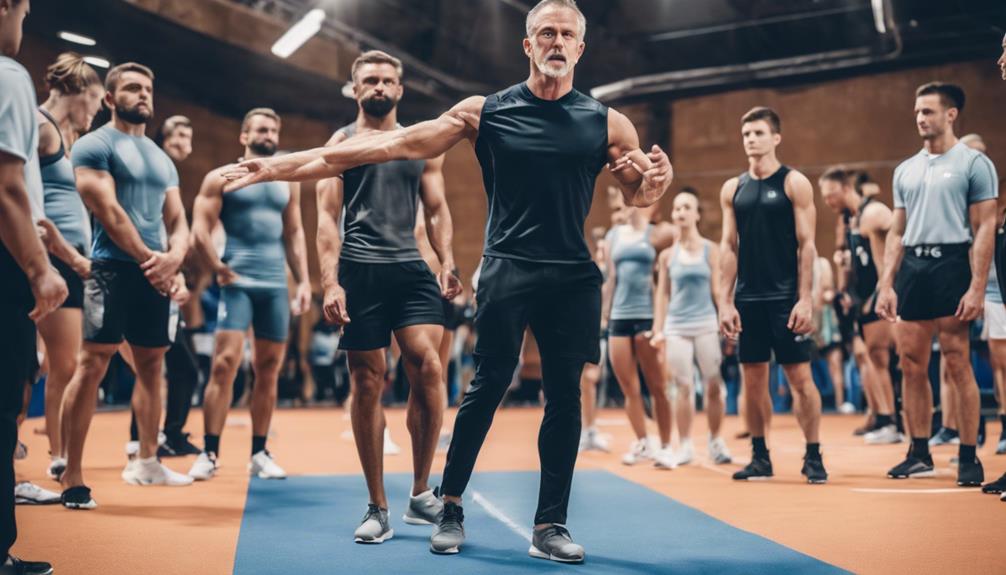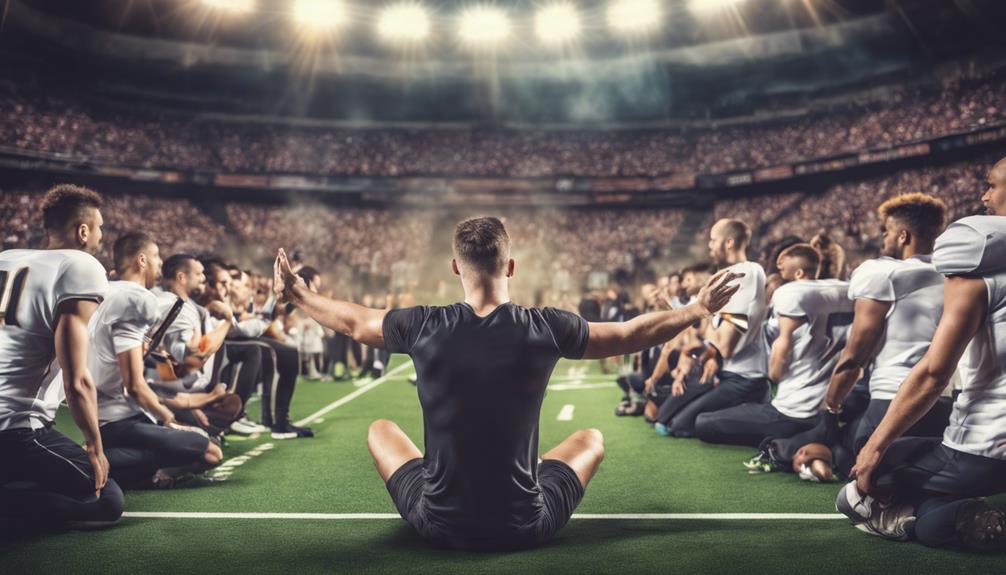Hypnosis offers athletes a potent method to boost sports performance by delving into the subconscious mind. Reprogramming beliefs can lead to improved focus, confidence, and resilience, as supported by research. Setting clear performance goals, visualizing success, and enhancing focus and concentration are key tips to maximize results. Overcoming performance anxiety, building mental toughness, and incorporating hypnosis into training can further elevate athletic performance. Utilizing these strategies can help athletes achieve their full potential on the field or court. Additional insights on utilizing hypnosis for sports performance are available in the comprehensive guide above.
Understanding the Power of Hypnosis

By delving into the realm of the subconscious mind, hypnosis offers a unique approach to enhancing sports performance. The benefits of hypnosis in sports are rooted in its ability to tap into the power of mental conditioning. Through hypnosis, athletes can reprogram their subconscious beliefs and behaviors, leading to improved focus, confidence, and overall performance.
Mental conditioning plays a crucial role in sports success. By using hypnosis techniques, athletes can address limiting beliefs, fears, and mental blocks that may be hindering their performance. Through guided imagery and positive suggestions, hypnosis helps athletes cultivate a winning mindset and develop the mental resilience needed to excel under pressure.
Research has shown that hypnosis can significantly improve athletic performance by enhancing concentration, reducing anxiety, and boosting self-confidence. By harnessing the power of the subconscious mind, athletes can unlock their full potential and achieve peak performance levels.
Hypnosis serves as a valuable tool in sports psychology, offering athletes a holistic approach to mental training that complements physical conditioning and skill development.
Setting Clear Performance Goals
Effective sports performance begins with the establishment of clear and measurable performance goals that guide athletes towards success. Goal setting is a fundamental aspect of mental preparation in sports, helping athletes focus their efforts, track progress, and stay motivated.
When setting performance goals, it is essential to make them specific, challenging yet achievable, and time-bound. Specific goals provide athletes with a clear target to work towards, while challenging yet achievable goals push them to improve without becoming discouraged. Time-bound goals create a sense of urgency and help athletes prioritize their actions effectively.
Athletes should consider setting both short-term and long-term performance goals to maintain motivation and track progress over time. Short-term goals can serve as building blocks towards achieving larger objectives, while long-term goals provide athletes with a broader vision of their desired outcomes.
Visualizing Success Through Hypnosis

Utilizing hypnosis techniques to visualize success has shown promise in enhancing sports performance through mental rehearsal and focus enhancement. Mental imagery, a key component of hypnosis, involves creating vivid mental pictures of successfully executing skills or achieving desired outcomes. By repeatedly visualizing oneself performing at a high level, athletes can enhance their confidence, reduce anxiety, and improve their overall performance on the field or court.
Incorporating positive affirmations during hypnosis sessions further reinforces the visualization process. Positive affirmations are statements that affirm desired outcomes or qualities, such as 'I am strong and focused' or 'I excel under pressure.' These affirmations help athletes cultivate a positive mindset, build self-belief, and overcome mental barriers that may impede their performance.
Research suggests that combining mental imagery with positive affirmations during hypnosis can lead to improved athletic performance by enhancing motivation, increasing mental resilience, and sharpening focus. Athletes who regularly practice visualization techniques with hypnosis may experience enhanced concentration, improved decision-making, and a greater sense of control during competitive situations.
Improving Focus and Concentration
Enhancing focus and concentration is a critical aspect of optimizing sports performance through hypnosis techniques. Mental strength plays a vital role in achieving peak athletic performance, and hypnosis can be a powerful tool to enhance this aspect.
By utilizing hypnosis for cognitive enhancement, athletes can train their minds to maintain unwavering focus during intense competition.
Hypnosis can help athletes develop a heightened sense of awareness, allowing them to block out distractions and stay fully engaged in the present moment. Through guided imagery and suggestion, hypnotherapy can reinforce positive thought patterns, boost confidence, and improve concentration levels.
Studies have shown that hypnosis can effectively enhance cognitive functions such as attention, memory, and decision-making skills. By incorporating hypnosis into their training regimen, athletes can sharpen their mental acuity and optimize their performance on the field or court.
Overcoming Performance Anxiety

Athletes can significantly benefit from harnessing hypnosis techniques to address and overcome performance anxiety, a common challenge that can impact their ability to perform at their best during competitions. Performance anxiety can manifest in various forms such as nervousness, self-doubt, and fear of failure, leading to decreased confidence and suboptimal performance. By utilizing hypnosis, athletes can learn to manage their anxiety more effectively and develop strategies to remain calm and focused under pressure.
Pre-game rituals can play a crucial role in helping athletes alleviate performance anxiety. Establishing a routine that includes relaxation techniques, visualization, and positive affirmations can help athletes enter a state of optimal readiness. These rituals not only serve to calm the mind but also create a sense of familiarity and control, reducing the impact of anxiety on performance.
Moreover, the mind-body connection is an essential aspect of overcoming performance anxiety. Hypnosis can help athletes cultivate a strong connection between their mental and physical states, enabling them to better regulate their emotions and physiological responses during high-pressure situations. By enhancing this connection, athletes can improve their overall performance and achieve greater success in their respective sports.
Enhancing Motivation and Drive
To further optimize sports performance, it is imperative to explore techniques that can bolster an athlete's motivation and drive towards achieving their goals. Hypnosis techniques and mental conditioning can play a significant role in enhancing an athlete's motivation levels. Through hypnosis, athletes can tap into their subconscious minds to reinforce positive beliefs, visualize success, and maintain a high level of motivation.
One effective hypnosis technique for enhancing motivation is creating mental imagery of achieving desired goals. By repeatedly visualizing success and the satisfaction that comes with it, athletes can boost their motivation to work towards those goals. Additionally, hypnosis can be used to instill a strong sense of determination and perseverance in athletes, helping them stay focused and driven even in the face of challenges.
Mental conditioning involves training the mind to stay motivated and driven through various mental exercises and strategies. This can include setting specific, achievable goals, developing a positive mindset, and practicing self-talk techniques to maintain motivation levels during tough times.
Utilizing Hypnosis for Recovery

Utilizing hypnosis as a tool for aiding in the recovery process post-injury can offer athletes a valuable method to enhance physical healing and mental resilience. Hypnosis for relaxation is a technique that can help athletes manage pain, reduce stress, and promote overall well-being during the recovery phase. By inducing a state of deep relaxation through hypnosis, athletes can experience relief from physical discomfort and accelerate the healing process.
Moreover, mental resilience through hypnosis plays a crucial role in the recovery journey. Athletes can use hypnosis to cultivate a positive mindset, enhance their coping mechanisms, and maintain motivation throughout the rehabilitation period.
Boosting Confidence Levels
Enhancing confidence levels through hypnosis can significantly impact an athlete's performance on the field or court. Confidence building is a fundamental aspect of mental strength in sports. By using hypnosis to target and reframe negative beliefs or self-doubt, athletes can cultivate a more positive belief system that enhances their overall confidence.
One powerful tool within hypnosis for boosting confidence levels is encouraging positive self-talk. Athletes can learn to replace negative inner dialogues with affirming statements that reinforce their abilities and strengths. This shift in self-talk can lead to a more resilient mindset and increased self-assurance during competitions.
Moreover, hypnosis can help athletes develop a robust belief system in their skills and capabilities. By accessing the subconscious mind, hypnotherapy can instill deep-seated beliefs in athletes' potential, fostering a strong sense of self-belief that transcends moments of doubt or pressure.
Creating Mental Toughness

Developing mental toughness is a critical component in optimizing athletic performance and resilience in the face of challenges. Building resilience and mental strength is essential for athletes to navigate the pressures and setbacks that come with competitive sports. Athletes with high levels of mental toughness can maintain focus, motivation, and composure even in high-stress situations, ultimately enhancing their overall performance.
To enhance mental toughness, athletes can utilize various strategies such as visualization techniques, mindfulness practices, goal-setting, and positive self-talk. These methods help athletes stay centered, motivated, and mentally resilient throughout training and competitions.
Additionally, seeking support from sports psychologists or mental performance coaches can provide athletes with tailored strategies to strengthen their mental fortitude. Research has shown that athletes with greater mental toughness exhibit improved performance, increased confidence, and better emotional regulation.
Incorporating Hypnosis Into Training
Integrating hypnosis into athletic training programs can offer athletes a unique method to enhance their mental focus and performance. By incorporating hypnosis techniques, athletes can tap into their subconscious mind to strengthen mental conditioning, improve confidence levels, and overcome performance barriers.
One key hypnosis technique used in sports is visualization, where athletes vividly imagine themselves achieving their goals, enhancing muscle memory and mental rehearsal.
Hypnosis can aid in reducing performance anxiety and increasing concentration levels during training and competitions. Through hypnotherapy sessions, athletes can learn to manage stress, control emotions, and develop a resilient mindset necessary for peak performance.
Mental conditioning through hypnosis can also help athletes stay motivated, set clear goals, and maintain a positive attitude towards training and competition.
Frequently Asked Questions
Can Hypnosis Improve Sports Performance for Beginners?
Mental preparation plays a crucial role in sports performance for beginners. Hypnosis can aid in enhancing focus, reducing anxiety, and building confidence. Through targeted suggestions, individuals can develop a positive mindset conducive to athletic success.
Is Hypnosis a Temporary or Long-Term Performance Enhancer?
Hypnosis can offer both temporary and long-term performance enhancements in sports. While immediate effects may vary, consistent practice can lead to enduring benefits. It primarily impacts mental aspects, like focus and confidence, which can translate to improved physical performance over time.
How Can Athletes Find a Qualified Sports Hypnotherapist?
To ensure optimal outcomes, athletes seeking a sports hypnotherapist should conduct a thorough qualifications assessment. Look for credentials such as certifications from reputable organizations, experience working with athletes, and positive testimonials. Selecting a qualified professional is crucial for effective results.
Can Hypnosis Help With Specific Sports-Related Injuries?
Hypnosis can aid in injury prevention by enhancing mental resilience, helping athletes develop coping strategies for stressors that contribute to injuries. Additionally, it can assist in pain management and accelerate recovery by addressing psychological components of physical ailments.
Are There Any Potential Side Effects of Using Hypnosis for Sports Performance?
When considering hypnosis for sports performance enhancement, it's crucial to acknowledge potential negative outcomes and risks involved. These may include unintended psychological effects, false memories, or exacerbation of pre-existing mental health conditions. Professional guidance is advised.
Conclusion
In conclusion, hypnosis can be a powerful tool for enhancing sports performance. It achieves this by improving focus, overcoming anxiety, boosting confidence, and promoting mental toughness.
By setting clear goals, visualizing success, and incorporating hypnosis into training, athletes can maximize their potential and achieve peak performance. Research supports the effectiveness of hypnosis in sports psychology, making it a valuable resource for athletes looking to excel in their sport.


